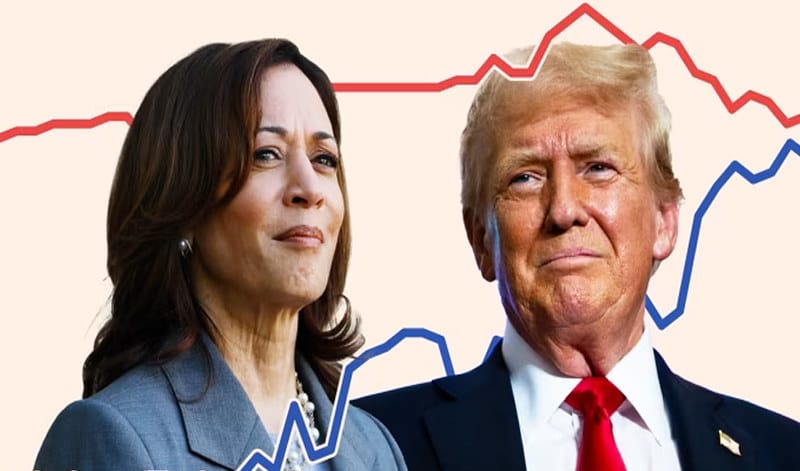The first presidential debate between former President Donald Trump and Vice President Kamala Harris was a pivotal moment in the 2024 election race. Held on September 10, this highly anticipated event took place at the National Constitution Center in Philadelphia, Pennsylvania, hosted by ABC News.
Lasting 90 minutes, the debate was a high-energy clash that underscored the stark differences between the candidates. With just weeks left before Election Day, the debate provided a key opportunity for both candidates to present their platforms, challenge each other, and sway undecided voters. Here are the major takeaways from this fiery exchange that shed light on the future of the United States.

1. Kamala Harris Kept Trump on the Defensive Early On
From the start of the debate, Kamala Harris came prepared with a strategy to unbalance Trump. She challenged him on multiple fronts, bringing up his past criminal investigations, the size of his rallies, and his business dealings. Instead of staying focused on policy, Trump took the bait, diverting into self-defense and even making bizarre claims, such as suggesting that immigrants were eating pets in Ohio.
Trump’s inability to stay on message worked to Harris’s advantage. She continued to press him on topics that pulled him away from the core issues voters care about, keeping him on the defensive throughout the night.
2. Trump Focused More on Defending His Record Than Outlining New Policies
While Harris came prepared to push forward her vision, Trump spent much of the debate defending his previous actions. Whether it was his handling of the pandemic, his ties with authoritarian leaders, or his past comments on women, Trump was frequently caught up in explaining or justifying his past behavior.
He also doubled down on conspiracy theories, especially regarding the 2020 election and immigration. At one point, Trump even reiterated his debunked claim about immigrants eating Americans’ pets, which led to pushback from the moderators.
Rather than laying out new plans for his next term, Trump relied on familiar talking points, which made him seem stuck in the past instead of offering forward-looking solutions.
3. Abortion: A Critical Moment in the Debate
One of the most defining moments of the debate was the conversation around abortion. With reproductive rights being a major issue in the 2024 race, both candidates had strong and opposing views. Kamala Harris condemned the restrictive abortion laws in place across many states, sharing stories of women denied necessary care. She passionately argued for women’s rights, calling Trump’s support of overturning Roe v. Wade “insulting” to women across the country.
Trump, however, took credit for the Supreme Court’s decision to overturn Roe v. Wade, stating that he had returned the power to the states and had done a “great service.” He refrained from taking a clear stance on a national abortion ban, making it one of the most heated and impactful exchanges of the debate.
4. Harris Framed Trump as Out of Touch with the Average American
Kamala Harris’s debate strategy involved painting a clear picture of Trump as disconnected from ordinary Americans. She emphasized her middle-class upbringing, positioning herself as a leader who understands the struggles of families and small business owners. In contrast, she portrayed Trump as someone who caters to the wealthy and corporate elites.
Harris’s approach resonated with voters looking for a candidate who could address their day-to-day concerns, from affordable healthcare to tax relief for the middle class. By focusing on Trump’s past actions and lack of connection with the common voter, Harris effectively drove home the message that she represents change.
5. Trump’s Admiration for Authoritarian Leaders Came Under Fire
Harris took multiple opportunities to criticize Trump’s relationships with authoritarian leaders, such as Russian President Vladimir Putin and Hungarian Prime Minister Viktor Orban. She warned that Trump’s affinity for these leaders could undermine U.S. democracy and its global standing. Trump, however, proudly highlighted these relationships as a sign of his strong leadership.
This exchange highlighted a key difference in their foreign policy outlooks: while Harris presented herself as someone who would stand up for democracy and human rights, Trump focused on building personal relationships with powerful global figures, regardless of their values.
6. Trump’s Ongoing Denial of the 2020 Election Results
Throughout the debate, Trump continued to deny the legitimacy of the 2020 election results. When questioned, he claimed his earlier comments acknowledging his loss were made sarcastically. He also avoided responsibility for the events of January 6th, maintaining that he had no role in the insurrection at the Capitol.
Harris capitalized on Trump’s refusal to let go of the 2020 election, painting him as someone still living in the past, unable to move forward and address the pressing challenges the country faces today. This furthered her strategy of positioning herself as a candidate focused on the future.
7. Harris Seeks to Define Herself Apart from Biden
One of Harris’s goals during the debate was to establish herself as a leader with her own identity, separate from President Joe Biden. Trump frequently tried to link Harris to Biden’s policies on inflation, immigration, and foreign affairs, but Harris made it clear that she represents a new generation of leadership. She emphasized her background as a prosecutor and her commitment to women’s rights, economic reforms, and social justice.
While Trump criticized Biden’s administration, Harris skillfully pivoted back to her vision for the country, avoiding being cast solely as Biden’s deputy.
Read my blog Who Will Win the 2024 Election? for more updates
Conclusion: A Debate of Clear Contrasts
The Trump-Harris debate offered voters a clear view of the contrasting approaches of both candidates. While Harris focused on the future, with emphasis on economic relief, women’s rights, and foreign policy reform, Trump remained defensive, primarily discussing his past actions and doubling down on conspiracy theories. Harris’s ability to keep Trump on the defensive and highlight his disconnect with ordinary Americans gave her the edge in this debate.
As Election Day draws closer, this debate will likely play a critical role in shaping voter perceptions and decisions.


Comments
2 responses to “Top Highlights from the 2024 Trump-Harris Showdown”
You really make it seem so easy along with your presentation however I find this matter to be actually one thing which I think I might never understand. It sort of feels too complex and very wide for me. I am looking forward on your subsequent put up, I¦ll try to get the dangle of it!
I am extremely impressed along with your writing abilities and also with the format in your
blog. Is that this a paid subject matter or did you customize it your self?
Either way stay up the nice quality writing, it’s rare to
see a nice blog like this one nowadays. Fiverr Affiliate!